August 14, 2012
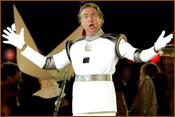 Eric Idle, accompanied by a proverbial crooning “fat lady”, has sung his song. The Olympic flame has been extinguished. The athletes are heading for home: Heathrow has even set up a special terminal for their departure, the front façade of which features a picture of a Guardsman saluting and “Good-bye” painted in white letters. I can imagine a street sweeper, broom in hand, gazing at the vast Olympic Park on the day after. The sunshine on Monday morning was patchy; I envisage him taking in the grandeur of the Olympic stadium, the twisted steel of the ArcelorMittal Orbit tower, and realising it’s all done. Usain Bolt has been and gone, Mo Farah flew across the finish line into history, Jessica Ennis became the darling of the nation. The final medal has been awarded, the remaining fireworks have been shot into the air, the last visitors have made their way back to their homes or hotel rooms. Perhaps at Monday’s dawn many of the closing ceremony’s spectators lay amidst tousled sheets, with Olympic paraphernalia on the floor and their heads full of dreams about national anthems, world records being shattered and queasiness about the Spice Girls’ re-union. The hour grew late, breakfast buffets with cheap overcooked sausages shut down for the morning, and many were probably hit with a headache once they dared open their eyes.
Eric Idle, accompanied by a proverbial crooning “fat lady”, has sung his song. The Olympic flame has been extinguished. The athletes are heading for home: Heathrow has even set up a special terminal for their departure, the front façade of which features a picture of a Guardsman saluting and “Good-bye” painted in white letters. I can imagine a street sweeper, broom in hand, gazing at the vast Olympic Park on the day after. The sunshine on Monday morning was patchy; I envisage him taking in the grandeur of the Olympic stadium, the twisted steel of the ArcelorMittal Orbit tower, and realising it’s all done. Usain Bolt has been and gone, Mo Farah flew across the finish line into history, Jessica Ennis became the darling of the nation. The final medal has been awarded, the remaining fireworks have been shot into the air, the last visitors have made their way back to their homes or hotel rooms. Perhaps at Monday’s dawn many of the closing ceremony’s spectators lay amidst tousled sheets, with Olympic paraphernalia on the floor and their heads full of dreams about national anthems, world records being shattered and queasiness about the Spice Girls’ re-union. The hour grew late, breakfast buffets with cheap overcooked sausages shut down for the morning, and many were probably hit with a headache once they dared open their eyes.
All finished, all done. The street sweeper, I imagine, took up arms along with his colleagues and began to brush up the detritus that remained: empty water bottles, discarded pamphlets, tissue papers and candy wrappers. Perhaps he sighed.
All finished, all done: no major disasters. Indeed, there was a glow of quiet pride on the morning of the 13th: everything worked, more or less, and Britain came third on the medals table. Even the ending was well timed: Monday the 13th is an appropriate date for a hangover of a day. Once the Paralympics come and go, and the last of the Proms plays out, we will settle into a dark autumn full of labours and await the arrival of Christmas. It is unlikely the Games will return to these shores in my lifetime; when the New Year rolls around and there is an inevitable discussion of the highlights of 2012, no doubt the Olympics will be one of the few glittering gems in an otherwise midnight tinted year.
I feel privileged to have had the opportunity to attend the Games. I put in for tickets as soon as I had the chance: in particular, I wanted to see a medal ceremony. On television at least, the award of an Olympic medal is a transcendent experience. The athletes have reached the very pinnacle of their endeavours: there is no one who surpasses them. Thus the medal endows them with a view from the greatest height. Then the national anthem plays, echoing a song of home; there is a pull on the heartstrings, the occasional tear, and then once the flags are raised to their highest height, there is often a wave to the spectators which clearly says “Thank you”.
I reckoned that it would be difficult to get tickets for most popular medal events such as athletics: I therefore placed my bets on sports that are less well known in the United Kingdom. I picked handball, fencing, wrestling and weightlifting. I also chose water polo. In the end, the sole ticket I received was for the Women’s Water Polo final on August 9th.
I came into London via King’s Cross; I fully expected an Olympic city to be absolutely bursting its seams with people. However, the train wasn’t full, and King’s Cross seemed no more bustling than usual. The differences were subtle: there were bright pink signs pointing the way to the Javelin trains for Olympic Park and volunteers in orange and dark purple shirts on hand at Arrivals, ready to dispense maps and information. The volunteers were cheerful and friendly; for someone used to London as being a city of hard edges and frequent scowls, this was a surprise. It is not difficult to think of London as a chilly spinster, one whose cruelties and inconsistencies would make the most ardent lover blanch, but this one time she opened her arms with tenderness.
Prior to arrival, I reserved an overpriced broom cupboard of a room in which to stay. That said, at least it was a clean broom cupboard. Then I took my Olympic ticket in hand and went back to King’s Cross St. Pancras. Prior to my departure on the Javelin, my other half and I had lunch: if there is an Olympic dividend for restaurants such as the one in which we dined, I did not see it being cashed in. There were plenty of empty tables, despite the tempting scent of fresh pizza being baked in a wood fired oven and the establishment being conveniently located at the main terminus for those going to the Games.
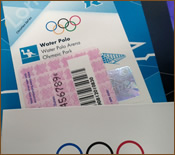 I kept on checking my ticket. The organisers are to be complimented for making the ticket itself special: it came via special delivery in an elegant purple folder. A special London 2012 Travelcard was enclosed along with my bright blue ticket for the event. The pocket inside the folder was emblazoned with the Olympic rings. With this in hand, I could not stop myself from singing “I’ve got a Golden Ticket” as I made my way to the dark blue-gray Javelin train.
I kept on checking my ticket. The organisers are to be complimented for making the ticket itself special: it came via special delivery in an elegant purple folder. A special London 2012 Travelcard was enclosed along with my bright blue ticket for the event. The pocket inside the folder was emblazoned with the Olympic rings. With this in hand, I could not stop myself from singing “I’ve got a Golden Ticket” as I made my way to the dark blue-gray Javelin train.
Transport had been one of my major worries; I planned my trip around making it as simple as possible to get to and from Olympic Park, thus I was staying in a King’s Cross janitor’s closet. However the Javelin ran frequently, was clean and I got a seat on my trip out. It took less than ten minutes to get to Stratford International. I stood up and saw the golden sunlight reflecting on the station. The second before the doors opened felt agonising; I recalled many years of watching the Olympics on television. I remembered watching Linford Christie triumph in 1992. I recalled Carl Lewis’ victories in 1988 and 1984. I even recollected Torvill and Dean in Sarajevo, 1984 and the last crashing bars of Bolero accentuating the end of their gold medal winning routine. As a boy in America, I remembered how ABC Sports would launch into a brass fanfare prior to any Olympics coverage: this was special. The strains of the fanfare bounced around in my mind as I stepped off the train and found my way to the escalator. I was in an Olympic city, now I was going to my first Olympic Games. The thrill of victory and the agony of defeat, as ABC would have said, lay in store.
Outside the glass and concrete station were people selling Olympic pins arrayed on coloured blankets. The countries and previous Games their wares represented was almost too much to take in: there was even a plastic figurine from the 1980 Moscow Olympics, not a Games noted for its merchandising prowess. I was unsure of the authenticity of what I was seeing, so I bought nothing: I looked up, saw the bright pink signs and carried on towards the Park. I was joining a vast sea of people in the process, a tide that was washing in. After all, the mighty Usain Bolt was due to run again in the 200 metres, and would quite possibly complete a historic double. The wave I was enmeshed in was full of people of many nationalities: Jamaican fans in green and gold, Dutch people in bright orange, Team GB supporters in red, white and blue. The final I was going to see featured a Bronze medal match between Australia and Hungary; the gold was to be decided between the United States and Spain. As an American, perhaps only nominally, I felt it was my duty to support the home team: however, I only had a Team USA LeBron James t-shirt to indicate my allegiance. As a result, I ended up on the more dull end of the spectator palette.
But never mind, the wave bubbled and roiled with enthusiasm and every language that was spoken was a unique means of expressing excitement. I proceeded through the Westfield shopping mall, a rather odd route, I thought, and then onto a walkway. It was at that point I could see the park itself and the stadium.
Words fall away at this point; “majestic” and “splendid” do not do justice to what I saw. Yes, in some ways it was like a gigantic rock concert: when asked later, I said to my interrogator to imagine the largest music gig they had ever attended and quintuple the numbers. It was altogether appropriate that many volunteers directed affairs from lifeguard chairs which stood above the crowds. I made my way towards the security area: my wave was halted by one of the volunteers with a bullhorn and a strong American accent. She allowed another group to cross and then we were permitted to proceed onward.
The tickets said to allow for two hours to get inside, and that security would be rather like in an airport. I entered the security tents with some trepidation: but the queues were short. They were manned by soldiers in desert fatigues and policemen, who were courtesy personified. The police and soldiers had a very close, almost chummy relationship as they did their work. I was screened and out in less than 5 minutes: a volunteer with a laser scanner was on the other side. He was a thin, elderly gentleman wearing a baseball cap. He examined my ticket and said, “Ah, water polo, have you seen it?”
“Only on television,” I confessed.
“You’ll enjoy it,” he told me, “it’s like rugby under water.”
Reassured, I then walked along the main concourse leading to the Olympic Park. It was vast. It is one thing to be told what a massive and expensive undertaking it is to host an Olympics, but here was one in full flow: surely being able to do this at all successfully was a testament to the genius of humanity. After all, when at full tilt, the BBC had 24 television channels up and running to cover all the events. Who manages the crowds, who looks after simple matters such as lavatories? What about ensuring people don’t get dehydrated? The volunteers told us to make sure we took in plenty of water. Every detail matters and has to be thought of: no wonder it’s a symbol of pride to host it well as the chances of failure are so great. But apart from some minor issues with transport and an accidental misuse of the South Korean flag when the North Korean one was required, it had been humming along.
I had a bit of time to wander around the Olympic Park: I bought two programmes rather quickly. There was a “Lucky Number 13” special offer, as it was Day 13 of the Games, so I bought both the main and daily programme for £13 rather than the usual £15. I then wanted to go to the London 2012 megastore, which was a large multicoloured box in the distance. It was ringed with a throng of people. Nearby was one of the largest McDonalds I had ever seen, an odd venue to see at the home of world sport. It was rather like finding a distillery in the middle of a teetotaler conference.
The Olympics, I quickly realised, is like a travelling circus. As I passed the Water Polo venue, I heard a cheerful announcement saying that it was temporary, inflatable and made of plastic. Much of the food was dispensed from tents. My understanding is that the Olympic Stadium will be partially dismantled. This gigantic show is only here for a short time and it’s not intended to be any other way: what comes after two weeks of such intense expenditure and effort? No wonder talk of legacy had littered the news.
I looked around and saw the crowds building further: I noticed that a fair few had clear plastic envelopes hanging around their necks to hold their tickets. Most I saw were off to the Athletics. I thought they were there for Usain.
I plucked up the courage to go to the London 2012 Megastore. Despite it being as large as its name implies, there were two full queues of people waiting to get inside. I swallowed hard and waited in the queue. Along the walls, a mural of athletes sponsored by Visa added to the commercial feel. I was pretty sure that I was about to be ripped off; at that point, I didn’t care. The queue took 15 minutes to navigate; behind me an Austrian tourist talked to some Americans. The Austrian was saying how much he loved London and understood the British people. The Americans were also impressed, commenting on how friendly the volunteers were and how much they were enjoying the Games. I wondered if it would be possible to send a DVD of the Games in place of trade ambassadors like Prince Andrew.
Finally, I got to the head of the queue and burst into the store. I have been through some intense shopping experiences, however, this was full-on contact sport with grabbing hands and even some mild pushing and shoving. I wanted several t-shirts. This ambition was made more difficult to achieve by the fact that at that point in the day the sizes were all mixed up. I reached up to the correct shelf on several occasions and found them littered with all sorts of sizes. The pressure of the crowds behind me meant that I was less discerning in my choices than I would have liked; I did not find a t-shirt for Water Polo, to my chagrin. I bought a Team GB t-shirt which proclaimed that it was “Our Greatest Team”, an Olympic Tennis t-shirt, which I thought was apropos given Andy Murray’s triumph and a London 2012 t-shirt for my other half. I then found a canvas bag with the logo of the 1980 Moscow Games. Finally, I got two Water Polo pins and bolted for the exit. I paid, probably too much, and then burst out back onto the main concourse. Team Jamaica’s fans were increasing in numbers; I thought it a pity there was no Guinness Punch, just standard Coca-Cola and Heineken beer.
I walked a bit further; I noticed a crowd of people looking up at the top of a dark blue edifice with coloured stripes. It took me a moment to realise I had found the studios of the BBC. Television is a wonderful means of conveying the wrong impression. One might have thought that they were in a plush, top quality venue. Rather, the edifice was made out of shipping crates. The studios at the top look pleasant enough, but it’s an illusion: it reminded me of Lego.
 I made my way to the Water Polo venue; this was accessed via a bridge leading over a canal. A royal barge was parked in the water, resplendent in mahogany and gold. A gentleman dressed from head to toe in clothing with Union Flag motifs, including a bow tie, passed over the bridge; presumably he had attended one of the earlier placement matches. He waved a large Union Flag for the benefit of photographers.
I made my way to the Water Polo venue; this was accessed via a bridge leading over a canal. A royal barge was parked in the water, resplendent in mahogany and gold. A gentleman dressed from head to toe in clothing with Union Flag motifs, including a bow tie, passed over the bridge; presumably he had attended one of the earlier placement matches. He waved a large Union Flag for the benefit of photographers.
Finally, we were let across the bridge. On the other side were several tents with more volunteers who again scanned my ticket. I got my first close look at the Water Polo venue: although it was temporary, it was nonetheless impressive: the aluminium scaffolding and profusion of plastic did reinforce its seeming transience. I touched a wall: thin plasterboard. I wondered where it would go after all this. What does one do with a temporary, inflatable water polo venue? I made a mental note to Tweet the organisers about this.
Dehydration was fast catching up with me; the summer sun had cooked me somewhat and I had a tell-tale dry taste in my mouth. I bought two bottles of Sprite Zero which looked particularly alluring as they’d been set in ice. It cost £4.60. Never mind, the first refreshing swallow helped.
The time came to go inside. I climbed up the aluminium staircase, feeling slightly as if I was on a construction site. This time next year, I thought, this won’t be here. It will have been recycled into other things. The Olympic Park itself will be rechristened the Queen Elizabeth II Olympic Park and the stadium will be sold to West Ham. I recalled a visit earlier in the year to Barcelona; I went to their Olympic stadium and could only find a museum and a few bronze plaques to remind everyone the Olympics happened at all. Also, the museum was closed. The only real memorial, I realised as I reached the top, was memory: and I had to absorb all of what I was about to see.
My seat was very high up: nevertheless, I could see the entire pool, which looked cool and inviting. I sat quietly as the crowd filed in. There were hordes of Australians, one bore an inflatable kangaroo. The Hungarians were more subdued: they carried their flags and wore red shirts. There were large numbers of Dutch people there: they had bought tickets in anticipation of their team making the final, however they had been sorely disappointed.
The Bronze medal match began: the water polo athletes paraded out in bathrobes, the Australians in green, the Hungarians in red. Each player’s name and number was introduced, the team captains shook each of their team members’ hands. After the introductions, I wondered if there was anything to be discerned from the way the team acted prior to the match. The Hungarians seemed to be a more tight knit group, with their coach acting as a surrogate father. The Australians dived into the pool in unison and swam across and back: this spoke of a much more professional approach. So: I assumed, this was going to be a contest between a family and an elite corps.
Water Polo matches are generally brief: they are made up of four periods of 8 minutes in length. As soon as one team has possession of the ball, a shot clock of 30 seconds starts counting down, rather like in basketball. This brevity leads to a generally fast pace: an information video displayed on the billboard also stated that each player swims about 5 kilometres per match. An American behind me said to his neighbour that underneath the surface, there is a lot of fighting going on: “It’s basically anything you can get away with,” he said. It often looks rather alarmingly like the players are trying to drown each other.
Hungary has pedigree in this sport; I favoured them. In the 1956 Melbourne Games, their men’s water polo team played in a semi-final against the Soviet Union. Due to the Soviets’ invasion of Hungary earlier that year to suppress a democratic revolution, there was a lot of ill feeling: this manifested itself into a particularly ugly encounter later known as the “Blood in the Water Match”. Hungary triumphed in that instance, 4-0.
Such great issues were not at stake in 2012. The Hungarians started slowly, the Australians were disciplined and focused. I thought I could sense a bit of reluctance on the Aussies part. They had been one of the favourites to win the gold: a bronze was better than nothing for them. The Hungarians, who hadn’t been fancied for anything, wanted it more; they played with passion, even if indiscipline was costly and granted an Australia the lead. The scores came close to evening up by the end of the fourth period. However, Hungary was still behind by one point, 11-10. The Australians began to relax in the final seconds. Then Dora Antal, a Hungarian player, did a final flick shot and the ball went in just as the buzzer rang. It was so remarkable that the crowd nearly gasped as one.
Australia went on to win in extra time; at the end they embraced each other as if they were more relieved than anything else. At least they had gotten the bronze.
As I waited for the next match, I wondered how I would feel once the Americans came in. After all, I hadn’t been to a competitive match of this kind before. Would I turn to a patriotic mess the moment the players walked out? Perhaps distance from the pool helped: I felt nothing in particular as the Americans and Spaniards emerged, the Americans in blue and red robes, and the Spanish wearing robes of red and gold. The same routine with the announcement of players and team captains was gone through.
Behind me, a British man had decided to support Spain. He cried out “Come on, Spain-uh” as loud as he could, as if adding the “uh” to the end of the country’s name would make it sound more sophisticated. When his wife asked him why he was being so vociferous, he replied, “They’re European”.
He was disappointed. The United States started slowly but then deployed a defensive strategy that made it very difficult for Spain to score. At one point the disparity reached six goals, 8 to 2 in favour of the United States. The gentleman behind me sounded almost pleading when he attempted to say “España” and “Come on, Spain-uh”. It was partly his passion which made me shout “Yes!” loudly every time the United States scored; I also may have joined in a couple of the inevitable “USA! USA!” chants. Personally, I didn’t care for the way Spain or America played: I much preferred the devil-may-care, go-for-broke Hungarians even if their methods hadn’t paid off. The Americans were almost industrial in their efficiency; this was until the fourth period when they seemed to be a combination of tired and complacent and Spain clawed 3 goals back. Spain had their problems too: they missed penalty shots they should have easily scored.
The final whistle sounded and the Americans erupted with joy; they pulled their coach into the water with them and formed a circle, celebrating with splashing around. The disconsolate Spanish quietly slipped out of the water. The Americans then emerged, the team posing with the flag for the world’s photographers.
It was not long after this I finally got to see what I had longed to witness. A podium was assembled out of large pieces of purple plastic. A frame was lowered on the side of the pool opposite to the podium; this was to hold the flags. The athletes donned tracksuits in the interim, and were led out to their positions. My mouth agape, I watched as the Australians were first called, and they mounted the podium; they got their bronzes and their flowers. They smiled and waved. It was better than nothing.
Spain was next. They received their silvers. They too smiled and waved. The Spaniards in the crowd started to sing “¡Olé! ¡Olé! ¡Olé!” and the team bobbed along in reply. OK, it wasn’t the gold, but it was an honour.
Then it was America’s turn. The athletes seemed all terribly young and fresh faced: this was an immense honour, earned through very hard work. OK, it wouldn’t be as well remembered as what Usain Bolt was doing across the way in the Athletics stadium, but nonetheless, they had reached their pinnacle. There was no higher to go.
After they received their gold medals and flowers, the announcer invited the audience to stand for the national anthem of the United States of America. The British gentleman who had difficulty pronouncing “Spain” departed. I stood, hand on heart and watched the Star Spangled Banner rise. The anthem, long unsung, tumbled out of my mouth as tears formed in my eyes. It’s been a long time since I departed America and there are days I wonder if there are any genuine ties that bind apart from family members living there. It is where I come from, not where I am or choose to be, but at that moment, it didn’t matter: oh say does that Star Spangled Banner yet wave, o’er the land of the free and the home of the brave.
And that was it. I stood and quietly descended the aluminium stairs. I took one last look at the stadium and Orbit tower from my vantage point: they glowed in the darkness. I checked my phone: Usain Bolt had indeed triumphed. No doubt all of Team Jamaica and their supporters would party through the night with the help of Guinness Punch. The vast tide of people was now proceeding out of Olympic Park, I caught onto the wave. I saw my first G4S security person: a gentleman in a bright green shirt. He was heavily outnumbered by regular police. The shopping mall was closed so the flow was redirected around a corner; one of the staff got carried away in showing us where to go. He was young, Asian, skinny and he wore dark framed glasses.
“Folks,” he shouted, “you should go that way!” And then he pointed just like Usain would. I smiled; others laughed.
I thought a bit about the American water polo team. They would head back to the Olympic Village, no doubt: from a distance, it looked like a block of flats, albeit with national banners affixed to the railings. I think most of the players were still at university; “Olympic gold medalist” no doubt would add to their resumes. Surely, it had been a wonderful experience: would they go to Rio to repeat? Was this the end? After all, it seemed unlikely the kind of sponsorship deals which would be available to Usain would come to them. When autumn came would they be hastening back to the red brick buildings of their colleges and fall into the mundane realities of exams, essays and the musty odours of library books? Possibly. The Olympics drew together people from nearly every nation with nearly every variant of reality to hand: at the end, the structure collapses and all flee back to their corners of the earth.
I sighed. The Javelin going back was much more cramped than the one I’d taken to get to Olympic Park. I found a place to stand on the 22:37, and after the 9 minute ride was over, I wandered back down the platform. The queue of people was carefully tended to and boxed in with ribbon dividers. One fellow in a blue jacket tried to break out of this; he was stopped by a fearsome West Indian guard with long hair. She brutally informed him that he wasn’t better than anyone else and that he should get into the queue like everyone else. He complied. I couldn’t recall London ever being so egalitarian.
I cast a glance at the train: cleaners in blue smocks were working inside to prepare it for the next trip. I doubted anyone would want to go out there again that night. I looked at my phone: soon it would be midnight and day 14. Time was almost up. All this would come to an end with fireworks, tears and farewells. But at least I’d seen part of it in person rather than through the distorted prism of television. I thought: I’ve had the chance to do a lot of interesting things, not least amongst them write a novel, earn a PhD, go to Prague in the winter, stand on the equator in Kenya, fall madly in love. This was another experience to add to the collection. There’s much more I want to and will do, but yes, I’ve lived.
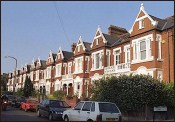 A good memory is both a blessing and a curse. I recall 1997 very clearly: I was 25 years old and just getting started. At the time, I lived in my parents’ home in west London. My bedroom was on the top floor of the house and from my window I could see the rooftops of many terraced homes before me, neatly aligned. I felt like I could skip from roof to roof all the way to the city centre.
A good memory is both a blessing and a curse. I recall 1997 very clearly: I was 25 years old and just getting started. At the time, I lived in my parents’ home in west London. My bedroom was on the top floor of the house and from my window I could see the rooftops of many terraced homes before me, neatly aligned. I felt like I could skip from roof to roof all the way to the city centre.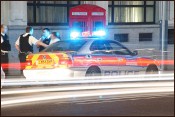 I waited a while longer, listening. Then, slowly, gingerly, I made my way up the stairs and phoned the police. I don’t recall precisely what I said but I am sure I stated that I wanted to be protected. It did not take long; I have never been happier to see the flashing blue lights of a police car. My sister came home. She was a bit worse for wear due to her long night out; she was a bit unsteady on her feet and had bags under her eyes. “I can’t deal with this,” she said. Fortunately, we had a friend of the family who knew the police quite well; she was over quickly. An emergency locksmith was called: he was pale, portly with short cropped red hair. He wore a blue t-shirt and carried a large canvas tool bag. He also remains in my memory the most polite and well mannered gentleman in Britain: he spoke calmly to me, and then set to work fixing the lock, which in his opinion and that of the police, had been jiggled and prodded open. The police suggested later that the trio were “semi-pro”.
I waited a while longer, listening. Then, slowly, gingerly, I made my way up the stairs and phoned the police. I don’t recall precisely what I said but I am sure I stated that I wanted to be protected. It did not take long; I have never been happier to see the flashing blue lights of a police car. My sister came home. She was a bit worse for wear due to her long night out; she was a bit unsteady on her feet and had bags under her eyes. “I can’t deal with this,” she said. Fortunately, we had a friend of the family who knew the police quite well; she was over quickly. An emergency locksmith was called: he was pale, portly with short cropped red hair. He wore a blue t-shirt and carried a large canvas tool bag. He also remains in my memory the most polite and well mannered gentleman in Britain: he spoke calmly to me, and then set to work fixing the lock, which in his opinion and that of the police, had been jiggled and prodded open. The police suggested later that the trio were “semi-pro”.
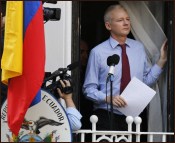 It was all so theatrical: the small balcony, the symbol of the Ecuadorian embassy affixed to the railing, the gold, blue and red of the Ecuadorian flag. Julian Assange, neatly dressed in a blue shirt and maroon tie, stepped out and spoke to his adoring fans.
It was all so theatrical: the small balcony, the symbol of the Ecuadorian embassy affixed to the railing, the gold, blue and red of the Ecuadorian flag. Julian Assange, neatly dressed in a blue shirt and maroon tie, stepped out and spoke to his adoring fans. In America, Representative Todd Akin of Missouri, a Republican candidate for the Senate, gave an interview in which he stated that pregnancy due to personal violation was rare due to biological defences which engage when “legitimate rape” occurs. This is a particularly unscientific position for an individual who sits on the House Science and Technology Committee to take. It was also no mere gaffe: Akin co-sponsored a bill in 2011 which stopped funding for abortion except in cases of “forcible rape”. Despite being rebuked by Mitt Romney and much of the Republican establishment, Akin has refused to drop out of the race.
In America, Representative Todd Akin of Missouri, a Republican candidate for the Senate, gave an interview in which he stated that pregnancy due to personal violation was rare due to biological defences which engage when “legitimate rape” occurs. This is a particularly unscientific position for an individual who sits on the House Science and Technology Committee to take. It was also no mere gaffe: Akin co-sponsored a bill in 2011 which stopped funding for abortion except in cases of “forcible rape”. Despite being rebuked by Mitt Romney and much of the Republican establishment, Akin has refused to drop out of the race.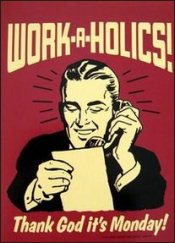 We all give off false impressions. The man who seems crass may be trying to protect a sensitive side. A person who appears to be overly ambitious may actually be very fearful. The strong are often weak, the commanding are sometimes morbidly uncertain, the happy are frequently morose. Human society is based on an amalgam of truth and fiction; we frequently reach for fantasies to make reality better than what it is. It’s no wonder a divergence between perception and fact often occurs.
We all give off false impressions. The man who seems crass may be trying to protect a sensitive side. A person who appears to be overly ambitious may actually be very fearful. The strong are often weak, the commanding are sometimes morbidly uncertain, the happy are frequently morose. Human society is based on an amalgam of truth and fiction; we frequently reach for fantasies to make reality better than what it is. It’s no wonder a divergence between perception and fact often occurs.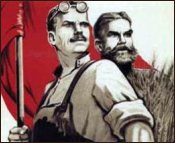 In the end, there is only one perfect truth: reality will assert itself, one way or another. Reality wove its way into the dogmatic ghetto of the Soviet Union: eventually, even the most hardened Politburo member was forced to recognise that humanity cannot have all its flaws and blemishes erased and mindless slogans and phony production targets will not make it otherwise. Once understood, it was time to dismantle the Berlin Wall: without a pristine society, there is nothing for it to protect, apart from a pointless, authoritarian cesspit whose only manufactures were misery, dissidence and lies.
In the end, there is only one perfect truth: reality will assert itself, one way or another. Reality wove its way into the dogmatic ghetto of the Soviet Union: eventually, even the most hardened Politburo member was forced to recognise that humanity cannot have all its flaws and blemishes erased and mindless slogans and phony production targets will not make it otherwise. Once understood, it was time to dismantle the Berlin Wall: without a pristine society, there is nothing for it to protect, apart from a pointless, authoritarian cesspit whose only manufactures were misery, dissidence and lies. Eric Idle, accompanied by a proverbial crooning “fat lady”, has sung his song. The Olympic flame has been extinguished. The athletes are heading for home: Heathrow has even set up a special terminal for their departure, the front façade of which features a picture of a Guardsman saluting and “Good-bye” painted in white letters. I can imagine a street sweeper, broom in hand, gazing at the vast Olympic Park on the day after. The sunshine on Monday morning was patchy; I envisage him taking in the grandeur of the Olympic stadium, the twisted steel of the ArcelorMittal Orbit tower, and realising it’s all done. Usain Bolt has been and gone, Mo Farah flew across the finish line into history, Jessica Ennis became the darling of the nation. The final medal has been awarded, the remaining fireworks have been shot into the air, the last visitors have made their way back to their homes or hotel rooms. Perhaps at Monday’s dawn many of the closing ceremony’s spectators lay amidst tousled sheets, with Olympic paraphernalia on the floor and their heads full of dreams about national anthems, world records being shattered and queasiness about the Spice Girls’ re-union. The hour grew late, breakfast buffets with cheap overcooked sausages shut down for the morning, and many were probably hit with a headache once they dared open their eyes.
Eric Idle, accompanied by a proverbial crooning “fat lady”, has sung his song. The Olympic flame has been extinguished. The athletes are heading for home: Heathrow has even set up a special terminal for their departure, the front façade of which features a picture of a Guardsman saluting and “Good-bye” painted in white letters. I can imagine a street sweeper, broom in hand, gazing at the vast Olympic Park on the day after. The sunshine on Monday morning was patchy; I envisage him taking in the grandeur of the Olympic stadium, the twisted steel of the ArcelorMittal Orbit tower, and realising it’s all done. Usain Bolt has been and gone, Mo Farah flew across the finish line into history, Jessica Ennis became the darling of the nation. The final medal has been awarded, the remaining fireworks have been shot into the air, the last visitors have made their way back to their homes or hotel rooms. Perhaps at Monday’s dawn many of the closing ceremony’s spectators lay amidst tousled sheets, with Olympic paraphernalia on the floor and their heads full of dreams about national anthems, world records being shattered and queasiness about the Spice Girls’ re-union. The hour grew late, breakfast buffets with cheap overcooked sausages shut down for the morning, and many were probably hit with a headache once they dared open their eyes. I kept on checking my ticket. The organisers are to be complimented for making the ticket itself special: it came via special delivery in an elegant purple folder. A special London 2012 Travelcard was enclosed along with my bright blue ticket for the event. The pocket inside the folder was emblazoned with the Olympic rings. With this in hand, I could not stop myself from singing “I’ve got a Golden Ticket” as I made my way to the dark blue-gray Javelin train.
I kept on checking my ticket. The organisers are to be complimented for making the ticket itself special: it came via special delivery in an elegant purple folder. A special London 2012 Travelcard was enclosed along with my bright blue ticket for the event. The pocket inside the folder was emblazoned with the Olympic rings. With this in hand, I could not stop myself from singing “I’ve got a Golden Ticket” as I made my way to the dark blue-gray Javelin train. I made my way to the Water Polo venue; this was accessed via a bridge leading over a canal. A royal barge was parked in the water, resplendent in mahogany and gold. A gentleman dressed from head to toe in clothing with Union Flag motifs, including a bow tie, passed over the bridge; presumably he had attended one of the earlier placement matches. He waved a large Union Flag for the benefit of photographers.
I made my way to the Water Polo venue; this was accessed via a bridge leading over a canal. A royal barge was parked in the water, resplendent in mahogany and gold. A gentleman dressed from head to toe in clothing with Union Flag motifs, including a bow tie, passed over the bridge; presumably he had attended one of the earlier placement matches. He waved a large Union Flag for the benefit of photographers.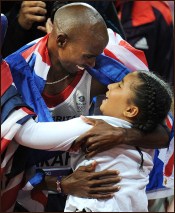 I think I’ll always remember where I was when I saw Mo Farah win the gold medal in the 10,000 meters. During the early stages, I sat in my living room, squirming and restless in my easy chair. I winced when I saw Mo nearly trip as two Eritreans passed him. As the race sped up and the number of laps relentlessly wound down, I became more tense. Finally, I couldn’t sit any longer: I stood up in front of my television, my fists clenched, willing him to break free of the Kenyans and Ethiopians who encircled him. When Mo finally got away, I started shouting, “Go! Go! Go!”; I didn’t care a jot if the neighbours thought I’d gone insane. When Mo crossed the line, his eyes glassy with exertion and perhaps disbelief, I shouted, “Yes!” My other half, bemused and still sitting on the sofa smiled at me indulgently. “Hello?” she asked.
I think I’ll always remember where I was when I saw Mo Farah win the gold medal in the 10,000 meters. During the early stages, I sat in my living room, squirming and restless in my easy chair. I winced when I saw Mo nearly trip as two Eritreans passed him. As the race sped up and the number of laps relentlessly wound down, I became more tense. Finally, I couldn’t sit any longer: I stood up in front of my television, my fists clenched, willing him to break free of the Kenyans and Ethiopians who encircled him. When Mo finally got away, I started shouting, “Go! Go! Go!”; I didn’t care a jot if the neighbours thought I’d gone insane. When Mo crossed the line, his eyes glassy with exertion and perhaps disbelief, I shouted, “Yes!” My other half, bemused and still sitting on the sofa smiled at me indulgently. “Hello?” she asked. In contrast, Félix Sánchez, the winner of the 400 metres hurdles, seemed to be an absolute wreck after his victory: after he crossed the line, he let out a disturbing cry that sounded like it came from the pit of his soul. When on the podium, he couldn’t stop the tears from flowing: it seemed odd that a winner would be so disconsolate. The scale of Sánchez’s triumph is enormous: he first won the title in Athens in 2004. He didn’t qualify for the final in 2008: his beloved grandmother, who raised him, died prior to the preliminary heats and this affected his performance. However, he is a man who apparently takes defeat to heart: for example, he wore a red flashing wristband between 2001 and 2004 to remind him of the fact that he didn’t qualify for the 400m hurdles final in the 2000 Sydney Games. After his Beijing debacle, it appears that he spent four difficult years climbing back up to the podium; his imperatives were made all the more intense by a promise he made to his deceased grandmother to win an additional medal. I can only imagine his investment of early hours, pain, sweat, and his muscles and joints fighting against the effects of overuse and age. I flinch at the thought of him having to use a weights machine to build up his legs and the sounds of metal wheels turning and squeaking cartilage in his knees. He achieved victory perhaps because he was honed to a razor’s edge of performance that less ambitious and perhaps less obsessive men could not achieve. He attained his objective: so now what? He is 34: will he try again in 4 years? Win or lose, then what? He did not run a victory lap with a daughter or son who would carry his legend forward in time.
In contrast, Félix Sánchez, the winner of the 400 metres hurdles, seemed to be an absolute wreck after his victory: after he crossed the line, he let out a disturbing cry that sounded like it came from the pit of his soul. When on the podium, he couldn’t stop the tears from flowing: it seemed odd that a winner would be so disconsolate. The scale of Sánchez’s triumph is enormous: he first won the title in Athens in 2004. He didn’t qualify for the final in 2008: his beloved grandmother, who raised him, died prior to the preliminary heats and this affected his performance. However, he is a man who apparently takes defeat to heart: for example, he wore a red flashing wristband between 2001 and 2004 to remind him of the fact that he didn’t qualify for the 400m hurdles final in the 2000 Sydney Games. After his Beijing debacle, it appears that he spent four difficult years climbing back up to the podium; his imperatives were made all the more intense by a promise he made to his deceased grandmother to win an additional medal. I can only imagine his investment of early hours, pain, sweat, and his muscles and joints fighting against the effects of overuse and age. I flinch at the thought of him having to use a weights machine to build up his legs and the sounds of metal wheels turning and squeaking cartilage in his knees. He achieved victory perhaps because he was honed to a razor’s edge of performance that less ambitious and perhaps less obsessive men could not achieve. He attained his objective: so now what? He is 34: will he try again in 4 years? Win or lose, then what? He did not run a victory lap with a daughter or son who would carry his legend forward in time.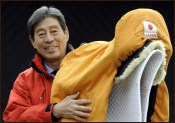 I wish I had something profound, brilliant and original to say about the London Olympics. However, a quick examination of the morning papers suggests that all the best superlatives and metaphors have been used, nearly every last sporting cliché has been deployed, and even fake sideburns, à la Bradley Wiggins, have become an essential fashion accessory. Sometimes, events are beyond further analysis or comment. The cynic occasionally finds the sharpened tongue dulled by enthusiasm, the sceptic has their dun-coloured outlook brightened by a spectacle like an Opening Ceremony that celebrates the National Health Service, the curmudgeon’s grumbles are stilled by marvels like the
I wish I had something profound, brilliant and original to say about the London Olympics. However, a quick examination of the morning papers suggests that all the best superlatives and metaphors have been used, nearly every last sporting cliché has been deployed, and even fake sideburns, à la Bradley Wiggins, have become an essential fashion accessory. Sometimes, events are beyond further analysis or comment. The cynic occasionally finds the sharpened tongue dulled by enthusiasm, the sceptic has their dun-coloured outlook brightened by a spectacle like an Opening Ceremony that celebrates the National Health Service, the curmudgeon’s grumbles are stilled by marvels like the 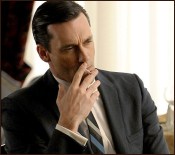 “Mad Men” also makes a statement about America as a whole: essentially, it suggests that it’s a land littered with psychologically questionable yet likeable phonies. Draper is a “self-made” man: his identity is based on fabrication. He possesses intelligence, cunning, but most of all, ambition; behind the winning smile and confident demeanour is a deeply insecure individual who cannot find respite from his desire for more. He does have “better angels”; sometimes they win, probably not often enough. He is furthermore often a slave to passion. Yet the viewer can’t hate him: for example, a visit he makes to his distressed colleague Peggy (who is languishing in hospital) prevents overt dislike of his character. One can’t truly warm to him either: he’s too unreliable. A comedian who has been cuckolded by Draper tells the dapper ad man that he’s “garbage” and “he knows it”; Draper doesn’t argue. Later, however, Draper punches the comedian in the face. It may be that many struggle with emotions about Draper’s country that are just as conflicted as their feelings about him. Many are likely charmed by the idea of a land of opportunity; they dislike what it takes to reach the upper echelons of American society. There is a belief that Americans are forthright; but perhaps “Mad Men” illustrates that this quality is a veneer, an overt falsehood which is all too detectable. It is a country in which many, like Peggy’s family, are imbued with a strong religious faith; it is also a place where casual adultery happens on a regular basis. It’s a nation that prides itself on being free, but “Mad Men” is full of characters like the closeted homosexual Sal Romano and the fad-chasing Paul Kinsey who seem anything but liberated. The Declaration of Independence states the “pursuit of happiness” is an inalienable right, but one of the show’s more memorable quotes is, “Everything you think’s gonna make you happy, just turns to crap.” It is fair to say that every society contains a coalition of opposites and the opportunity to say “on the other hand”: perhaps these contradictions pull at each other with greater vigour in the United States than elsewhere. This may be the subtle cause of the writhing restlessness that lurks behind the sharply tailored suits, the regularity of three drinks at six o’clock, and the brightly polished Cadillacs. The Sixties are shown to be good times, yet much is terribly wrong.
“Mad Men” also makes a statement about America as a whole: essentially, it suggests that it’s a land littered with psychologically questionable yet likeable phonies. Draper is a “self-made” man: his identity is based on fabrication. He possesses intelligence, cunning, but most of all, ambition; behind the winning smile and confident demeanour is a deeply insecure individual who cannot find respite from his desire for more. He does have “better angels”; sometimes they win, probably not often enough. He is furthermore often a slave to passion. Yet the viewer can’t hate him: for example, a visit he makes to his distressed colleague Peggy (who is languishing in hospital) prevents overt dislike of his character. One can’t truly warm to him either: he’s too unreliable. A comedian who has been cuckolded by Draper tells the dapper ad man that he’s “garbage” and “he knows it”; Draper doesn’t argue. Later, however, Draper punches the comedian in the face. It may be that many struggle with emotions about Draper’s country that are just as conflicted as their feelings about him. Many are likely charmed by the idea of a land of opportunity; they dislike what it takes to reach the upper echelons of American society. There is a belief that Americans are forthright; but perhaps “Mad Men” illustrates that this quality is a veneer, an overt falsehood which is all too detectable. It is a country in which many, like Peggy’s family, are imbued with a strong religious faith; it is also a place where casual adultery happens on a regular basis. It’s a nation that prides itself on being free, but “Mad Men” is full of characters like the closeted homosexual Sal Romano and the fad-chasing Paul Kinsey who seem anything but liberated. The Declaration of Independence states the “pursuit of happiness” is an inalienable right, but one of the show’s more memorable quotes is, “Everything you think’s gonna make you happy, just turns to crap.” It is fair to say that every society contains a coalition of opposites and the opportunity to say “on the other hand”: perhaps these contradictions pull at each other with greater vigour in the United States than elsewhere. This may be the subtle cause of the writhing restlessness that lurks behind the sharply tailored suits, the regularity of three drinks at six o’clock, and the brightly polished Cadillacs. The Sixties are shown to be good times, yet much is terribly wrong.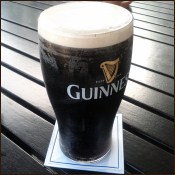 A trip to Dublin offers me an opportunity to visualise another self. I have had two distinct chances to move to Ireland: the first was when I was a callow intern in the Information Technology industry back in the mid 1990s. Thanks to Ireland’s burgeoning high tech economy, it seemed like a prudent place to go: the opportunity disappeared nearly at the last minute. The second time was in 2002; there was a stock images firm based in County Kerry, and it was entirely possible I could have worked for them as a Webmaster. I recall the cramped Ryanair flight from Stansted, the basic airport, a long taxi ride which cost a fistful of Euros, and the near-empty guest house in which I stayed. The landlady who tended it had short dark hair, introduced me to the glory of Irish cooked breakfasts and told me that I was “very welcome”. I believed her. One night, I went down to a pub in the centre of Tralee; as I entered, I noticed that many awards hung on its old oak panelled walls which stated that it served a top class pint of Guinness. I sat at the bar, the locals somewhat curious as to what I, a foreigner, would make of the glass of pitch black liquid with a creamy head. I brought it to my lips, sipped, and the rich and flavoursome nectar flowed over my tongue. Yes. I sat quietly, no one but the aged barkeep engaged me in conversation; it was fine, given the quality of that pint compared to it’s British counterparts, I wanted to focus my attention on what I was drinking. After I finished it, I quietly said “Thank you”; the barkeep nodded.
A trip to Dublin offers me an opportunity to visualise another self. I have had two distinct chances to move to Ireland: the first was when I was a callow intern in the Information Technology industry back in the mid 1990s. Thanks to Ireland’s burgeoning high tech economy, it seemed like a prudent place to go: the opportunity disappeared nearly at the last minute. The second time was in 2002; there was a stock images firm based in County Kerry, and it was entirely possible I could have worked for them as a Webmaster. I recall the cramped Ryanair flight from Stansted, the basic airport, a long taxi ride which cost a fistful of Euros, and the near-empty guest house in which I stayed. The landlady who tended it had short dark hair, introduced me to the glory of Irish cooked breakfasts and told me that I was “very welcome”. I believed her. One night, I went down to a pub in the centre of Tralee; as I entered, I noticed that many awards hung on its old oak panelled walls which stated that it served a top class pint of Guinness. I sat at the bar, the locals somewhat curious as to what I, a foreigner, would make of the glass of pitch black liquid with a creamy head. I brought it to my lips, sipped, and the rich and flavoursome nectar flowed over my tongue. Yes. I sat quietly, no one but the aged barkeep engaged me in conversation; it was fine, given the quality of that pint compared to it’s British counterparts, I wanted to focus my attention on what I was drinking. After I finished it, I quietly said “Thank you”; the barkeep nodded. 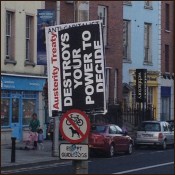 Furthermore, at least some of the young are completely alienated. A number of lanes intersect Grafton Street: in the bright sunshine, carts selling silver jewellry predominate these alleys. I saw one young man, tall and thin, with blue eyes and blonde hair and wearing a bright green baseball cap, talking to some tourists from Spain as he wrapped up their purchases. The Spanish seemed curious, why hadn’t the Irish rebelled in the same way as their afflicted counterparts in Greece? There had been a referendum on the “Austerity Treaty”, it had passed, and that was all. Why there were no mass movements like the Spanish indignados?
Furthermore, at least some of the young are completely alienated. A number of lanes intersect Grafton Street: in the bright sunshine, carts selling silver jewellry predominate these alleys. I saw one young man, tall and thin, with blue eyes and blonde hair and wearing a bright green baseball cap, talking to some tourists from Spain as he wrapped up their purchases. The Spanish seemed curious, why hadn’t the Irish rebelled in the same way as their afflicted counterparts in Greece? There had been a referendum on the “Austerity Treaty”, it had passed, and that was all. Why there were no mass movements like the Spanish indignados?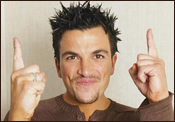 In my opinion, only once has Peter Andre been remotely interesting. Several years ago, he appeared on a television programme about age: with the assistance of extensive protesthetics, some acting lessons and clothing procured at a charity shop, he tried to appear much older than he actually is. He attempted to fool his then wife, the pneumatic Katie Price, into thinking he was an Anglican vicar who disapproved of her lifestyle. He gave the game away fairly quickly by addressing her with a private nickname; this thoughtless slip caused the entire prank to dissolve into laughter and embarrassment.
In my opinion, only once has Peter Andre been remotely interesting. Several years ago, he appeared on a television programme about age: with the assistance of extensive protesthetics, some acting lessons and clothing procured at a charity shop, he tried to appear much older than he actually is. He attempted to fool his then wife, the pneumatic Katie Price, into thinking he was an Anglican vicar who disapproved of her lifestyle. He gave the game away fairly quickly by addressing her with a private nickname; this thoughtless slip caused the entire prank to dissolve into laughter and embarrassment.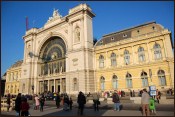 Budapest, then, was a respite. Red poppies grew in the rail yard and swayed on a warm breeze; the station was a magnificent piece of 19th century architecture, a testament to belief in industry and progress. The silvery Danube flowed through the middle of the city; on both the Buda and the Pest side, there was an air of well-being, punctuated by delicate music plucked out by a busker with a zither. I fear this sense of bonhomie has since deserted the place.
Budapest, then, was a respite. Red poppies grew in the rail yard and swayed on a warm breeze; the station was a magnificent piece of 19th century architecture, a testament to belief in industry and progress. The silvery Danube flowed through the middle of the city; on both the Buda and the Pest side, there was an air of well-being, punctuated by delicate music plucked out by a busker with a zither. I fear this sense of bonhomie has since deserted the place.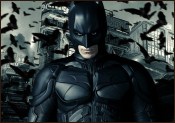 Christopher Nolan’s “Dark Knight” trilogy has dramatically altered how we view “superhero” films. Prior to “Batman Begins”, there was an expectation that such movies would be as lurid as their printed counterparts; the audience’s suspension of disbelief was taken for granted, their willingness to accept a villain, say, who had fallen into a vat of chemicals at a playing card factory and thus was rendered “The Joker”, was assured. Villains’ lairs could be absurd, like Tommy Lee Jones’ Two Face’s divided home, each side featuring its own appropriately attired moll serving quail’s eggs on one half, and donkey meat on the other.
Christopher Nolan’s “Dark Knight” trilogy has dramatically altered how we view “superhero” films. Prior to “Batman Begins”, there was an expectation that such movies would be as lurid as their printed counterparts; the audience’s suspension of disbelief was taken for granted, their willingness to accept a villain, say, who had fallen into a vat of chemicals at a playing card factory and thus was rendered “The Joker”, was assured. Villains’ lairs could be absurd, like Tommy Lee Jones’ Two Face’s divided home, each side featuring its own appropriately attired moll serving quail’s eggs on one half, and donkey meat on the other.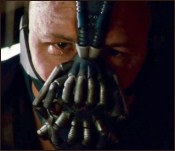 Batman’s return is necessary because the city is menaced by a new villain: Bane, as played by Tom Hardy. Perhaps the most unsatisfying aspect of the film is the lack of a full explanation of his origins: Bane has the physique and visage of a Mexican wrestler but speaks with the accent, intonation and eloquence of a Shakespearean actor. He is shown to have a sensitivity and appreciation for music, but is also capable of extraordinary violence. It is disturbing to consider that someone so obviously cultured can also be extremely brutal: however, many of the worst monsters that have plagued modern history, for example Reinhard Heydrich, possessed this combination.
Batman’s return is necessary because the city is menaced by a new villain: Bane, as played by Tom Hardy. Perhaps the most unsatisfying aspect of the film is the lack of a full explanation of his origins: Bane has the physique and visage of a Mexican wrestler but speaks with the accent, intonation and eloquence of a Shakespearean actor. He is shown to have a sensitivity and appreciation for music, but is also capable of extraordinary violence. It is disturbing to consider that someone so obviously cultured can also be extremely brutal: however, many of the worst monsters that have plagued modern history, for example Reinhard Heydrich, possessed this combination.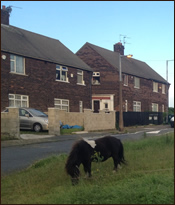 There is a path that runs in parallel to the playing fields of St. Clare’s Catholic School in Fagley, Bradford. Along its sides grow thistles and nettles and every type of suburban wild flower. Walk down from the path’s entrance on Moorside Road, avoid the prickles and stinging leaves, and ignore the bark of loud, alarmed dogs from neighbouring yards. At the end, lay one the quietest neighbourhoods in Bradford. I strolled down this way on Wednesday evening.
There is a path that runs in parallel to the playing fields of St. Clare’s Catholic School in Fagley, Bradford. Along its sides grow thistles and nettles and every type of suburban wild flower. Walk down from the path’s entrance on Moorside Road, avoid the prickles and stinging leaves, and ignore the bark of loud, alarmed dogs from neighbouring yards. At the end, lay one the quietest neighbourhoods in Bradford. I strolled down this way on Wednesday evening. Keep walking: turn off onto another path, and one happens onto another world. Step beyond the concrete bollards ringed with graffiti and rubber tyres, and there are rolling hills and green fields: brown and white ponies graze in open pastures. There is a line of trees along a ridge which sways in the passing breeze. My other half spotted a broken farmhouse, made of alabaster Yorkshire brick which overlooks this scene. In the distance lay the tidy houses of north Bradford, and as I looked at the horizon, I saw a plane making its final descent into Leeds Bradford Airport. This was a view that one would want to wake up to every morning; my other half and I examined the wrecked farmhouse and wondered if it was for sale and how much it would cost to rebuild. I could imagine the floors, now covered in shattered brickwork, replaced with laminate, the scents of coffee and toast emanating from a rebuilt kitchen, and the dawn’s first rays coming through a large window. If I were sufficiently wealthy, I would have run to the nearby riding school and asked “How much?” and endured months of an insane project just to acquire the life the farmhouse promised. But that’s just a dream: we walked on, and found a dip and then a bend in the road which led to a steep incline. A meadow in which buttercups grow lay to our right. A tidy Victorian terrace and several modern cottages overlooked it. We had arrived in Eccleshill.
Keep walking: turn off onto another path, and one happens onto another world. Step beyond the concrete bollards ringed with graffiti and rubber tyres, and there are rolling hills and green fields: brown and white ponies graze in open pastures. There is a line of trees along a ridge which sways in the passing breeze. My other half spotted a broken farmhouse, made of alabaster Yorkshire brick which overlooks this scene. In the distance lay the tidy houses of north Bradford, and as I looked at the horizon, I saw a plane making its final descent into Leeds Bradford Airport. This was a view that one would want to wake up to every morning; my other half and I examined the wrecked farmhouse and wondered if it was for sale and how much it would cost to rebuild. I could imagine the floors, now covered in shattered brickwork, replaced with laminate, the scents of coffee and toast emanating from a rebuilt kitchen, and the dawn’s first rays coming through a large window. If I were sufficiently wealthy, I would have run to the nearby riding school and asked “How much?” and endured months of an insane project just to acquire the life the farmhouse promised. But that’s just a dream: we walked on, and found a dip and then a bend in the road which led to a steep incline. A meadow in which buttercups grow lay to our right. A tidy Victorian terrace and several modern cottages overlooked it. We had arrived in Eccleshill. I'm a Doctor of both Creative Writing and Manufacturing and Mechanical Engineering, a novelist, a technologist, and still an amateur in much else.
I'm a Doctor of both Creative Writing and Manufacturing and Mechanical Engineering, a novelist, a technologist, and still an amateur in much else.




